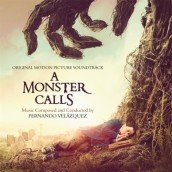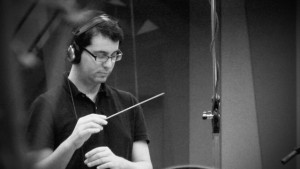
A MONSTER CALLS composer Fernando Velazquez | ©2016 Fernando Velazquez
Death and transfiguration are two themes that have often accompa-nied the scores of Fernando Velazquez. Powerfully embodying a new generation of orchestrally rich Spanish composers to steadily take root in Hollywood, Velazquez rose from numerous shorts in his na-tive country to impress Hollywood with his lush, alternately creeping and raging sense of old school melody for DEVIL, MAMA singing with a romantic sense of aristocratic doom for CRIMSON PEAK and PRIDE AND PREJUDICE AND ZOMBIES.
A particularly resonant ferryman for Velazquez when coming to grips with the inevitable, as well as the potential radiant light afterwards, is filmmaker J.A. Bayona. Creating a haunting orchestral tapestry for 2007’s THE ORPHANAGE, Velazquez heard just as much emotion as fear from a woman’s return to the old haunts of her childhood with a collaboration that truly put modern Spanish horror on the map. The director and composer next travel to Thailand with 2012’s THE IMPOSSIBLE. the devastating loss of thousands of lives from it tsunami enabling Velazquez to embody a one family’s anguished and tender struggle to survive and reunite.
Now Bayona and Velazquez draw on all of their Gothically emotional power for a story steeped in equal parts tragedy, fantasy, anger and acceptance with A MONSTER CALLS. Hearing the resounding cry of a score steeped in chilling majesty dark enchantment and tearful disbelief is Conor (Lewis MacDougall), a boy facing the imminent loss of his Mum (Felicity Jones) and a future spent with a seemingly evil Grandma (Sigourney Weaver). Calling upon his brutalizing anger, Connor summons the tree-like Monster (Liam Neeson), who regales the youth with seemingly disparate animated stories, all of which will finally combine for Connor to truly face the reality of his sad situa-tion. It’s a coming to terms that Velazquez plays with a devastating, beautiful power rooted as much in the monstrous musical tradition of the organ, thunderous brass and angered strings as it draws from the lyrical power of piano harmonies, angelic voices and a poetic or-chestra. A MONSTER CALLS is Velazquez’s most powerful stride yet from Spain into a Hollywood, swinging with astounding might that plays the seeming supernatural and the all-too real heartstrings with equal, impressive passion.
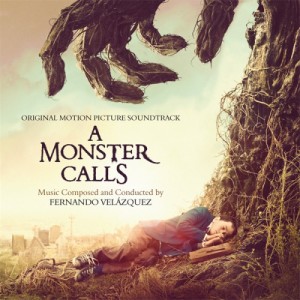
A MONSTER CALLS soundtrack | ©2016 Back Lot Music and Quartet Records
ASSIGNMENT X: Your first English language score was for the thoroughly creepy incest drama SAVAGE GRACE. What are your memories of it?
FERNANDO VELAZQUEZ: It was a wonderful movie that had great performances by Julian Moore and Eddie Redmayne, who got really big after this movie. For the score, I just had some strings. People say it’s the old-fashioned way, but I would say it’s a classical way that always works in good movies. It was dark and a little bit romantic, which addressed what the director Tom Kalin (SWOON) wanted in this movie.
AX: How did you begin your collaborations with J.A. Bayona? And how do you think THE ORPHANAGE set the tone for his running theme of coming to terms with death?
VELAZQUEZ: We started in short films before anything else. We did EL HOMBRE ESPONJA, a really nice short. You can still listen to the music, as I recorded it last year for Quartet. “The Orphanage” set the tone of his running theme of coming to terms with death.
AX: What was it like to score the epic, real-life tragedy of THE IMPOSSIBLE with J.A.?
VELAZQUEZ: Even though these movies all have themes of death, love and moth-erhood they are all also quite different, along with my scores for them. THE IMPOSSIBLE is the most intense and film of our collabora-tions. THE ORPHANAGE was very dramatic with the neo-romantic old orchestra. A MONSTER CALLS is really different for me, because the approach is really minimal and inspired by the three stories the mon-ster is telling. It scope is smaller in a way, and not so sad as “Monster” is commenting on a story outside of the story. THE ORPHANAGE is a story within itself.
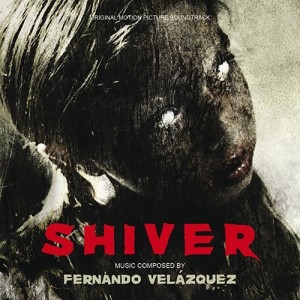
SHIVER soundtrack | ©2016 Movie Score Media
AX: You made a pilgrim’s progress through such Spanish thrill-ers as SHIVER before your first Hollywood horror film with the elevator-set DEVIL. What do you think are the biggest differences between both countries’ approach to genre films?
VELAZQUEZ: There aren’t many differences between horror movies from country to country, but rather movie to movie. One Spanish horror film can be completely different from another Spanish horror film, and the same thing goes for American films. Nowadays, directors can do great things and make fantastic movies without a large budget. You can still have that big orchestra sound in a low cost movie. It’s just about what the story needs. The difference comes from the director and how he wants to portray the movie. In that way, A MONSTER CALLS is very intense because we want the audience to feel what the characters are feeling. We want to address this so the music was in-tense, not epic. It’s their emotion, as opposed to the story, that gets epic. If you listen to the music without the movie, you might think it’s over the top. But when you watch the movie, you know the music is exactly how you’re feeling during it, which fits the film perfectly.
AX: How did you want to draw on your horror scoring, and general full-blooded gothic scoring in musically depicting The Monster?
VELAZQUEZ: The stories are kind of different. They are big and the orchestra is big with big harmonies. The choir is there. There is a feeling of adventure and story telling which works very well with tales. It works beautifully with the watercolors we see in the movie. Whereas, the music for reality is quite small, probably the smallest you get for the purpose because it’s a little piano and some strings. Only in the end, they come together in a metaphorical way because the choir paints a reality and accompanies Connor and his mother.
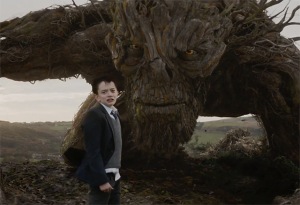
A MONSTER CALLS | ©2016 Focus Features
AX: How did you want to draw on your horror scoring, and general full-blooded gothic scoring (complete with organ) in musically depicting The Monster?
VELAZQUEZ: Well the music for the monster, of course, includes the organ at some point. We looked for many different sounds of woodwind and bagpipes. The woodwinds in the orchestra and a lot of wooden things that we thought would work with the monster. But in the end, we realized that the monster is more ominous, like the wood it-self. This ominous threat we feel is more from the bass, strings, the bass brass and the woodwinds, than everything else. But as we worked on the movie we realized that we didn’t need the tree to be felt as a threat. We tried with the choir, it worked really well, but we realized the choir would work better with other things in the movie like the end and when Connor is desperate and the times when it seems mankind is telling Connor that everything is going to be all right.
AX: How did you want to score Conor, given a hard shell where him dealing with his mother’s deterioration becomes a sadomasochistic need for punishment?
VELAZQUEZ: I think this was really well depicted by the movie itself. It didn’t need a lot of music for suffering. We tried to make things even worse with the bullying and the hard feelings he put on himself. But this music was not needed at all, because really small music was already making the audience feel sorry for Connor. There is a moment in the piece “Break Things” when he destroys everything, which is even more brutal with abstract noises more than the music itself. It’s a cue I’m very proud of.
AX: Given the tendency of many genre scores to use some form of sampling or electronics, why did you want to go for an old school orchestral feeling here?
VELAZQUEZ: I never thought about it. You know my first approach was orchestra with this movie because we thought it was best. We never thought about electronics. You could, of course, score this movie with elec-tronics. It might be good, but we think that for the movie, it wouldn’t make sense, or at least I like it better with strings.
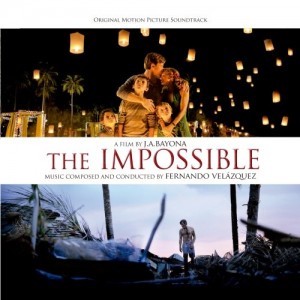
THE IMPOSSIBLE soundtrack | ©2016 Quartet Records
AX: Everyone goes through loss. Did you have any such instances in your own life that you particularly drew on for this score?
VELAZQUEZ: Not really. But it’s funny, because our own experience with THE IMPOSSIBLE was used because we wanted to do the opposite in a way. And of course you know music is like a magnet. You get all of the emotions you put in it. Of course, in the last cue called “The Truth,” there is a lot of my life, but also the players’. A lot of them can put their experiences and heart into the music they play, listen or com-pose.
AX: Conversely, how did you want the score to reflect the ten-sion and beauty of the mother-father-“evil stepmother” relationships with Connor, especially with the pain they all endure?
VELAZQUEZ: From what I’ve seen, this is something that works very well in the movie without music. The stepmother doesn’t have her own theme, even when she’s kind of depicted as the queen in the tale, which is not obvious. It’s not the direct connection you can talk about. We have the idea that the stepmother looks evil and cruel, we know she’s not. At first we tried to do that with the music. But that didn’t turn out to be a good idea because it was too obvious.
AX: Given the understandably heightened emotions of MONSTER CALLS how important was it for you and J.A. to avoid overt manipulation, and to honestly earn tears, even while using such devices as piano and a heavenly chorus that practically guarantee them?
VELAZQUEZ: I think with this movie, practically anything would guarantee tears, even the synthesizer woodwinds, a piano, singing, a flute, organ… anything what would cause the same thing. I think sometimes emo-tions come by themselves very naturally, so we didn’t spend much time trying to see how far we could go with the music. It’s opposite to THE IMPOSSIBLE where you have feelings, but you won’t necessarily be crying while watching the film. In the end, what makes you cry is the story itself and how you relate to the storyline.
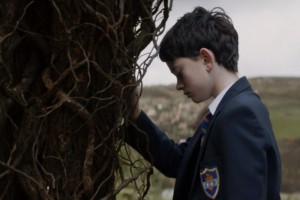
A MONSTER CALLS | ©2016 Focus Features
AX: While kids might be enchanted by the creature in the trailer, A MONSTER CALLS is far more of a film for adults in how dark and disturbing it is. How did that affect your scoring?
VELAZQUEZ: Well, we could have done a fairy tale or something more for children, but the music itself is kind of somber. I wouldn’t say “adult” be-cause this is something that is difficult to address. We needed to play with the cards we were dealt, the ones that we were working with. Now, for some moments we thought the tales were a bit light-er and they work faster in the movie, But then we realized many de-tails would be missing. You know sometimes you’re afraid the movie feels slow. But we thought it was good for this movie to have this pace, which is a little far away from a movie for kids.
AX: Conversely, how did you want your music to provide a sense of acceptance and emotion, especially for kids who might want to see this as some form of therapy? In that respect, would you say that this score itself goes through “the five stages?”
VELAZQUEZ: I read the five stages. It’s just some therapy thing, but you don’t necessarily need to go through all the five stages. The music is more about accepting. There is no denial or rage in the movie, ex-cept there is a little bit of rage where the music is more literal. Honestly, for the most part, it feels as though it is more about humankind and ancestry, as we can see in the tree and the grandfather and grandmother. I don’t think that it’s a coincidence that the main sce-ne in the movie happens in a cemetery, where ancestors were bur-ied. I think this scene goes directly with the collective consciousness way of thinking, which is what art connects us with. The movie itself is a huge metaphor about how we can deal with reality. The music is the ultimate stage of this metaphor. The music tells you that with melodies not words.
AX: In the end, do you think horror films, and their music is a way of dealing with death?
VELAZQUEZ: Well not really, because horror films deal with death in a very precise way. They are usually not serious films about death. THE ORPHANAGE is not a horror movie, or THE SIXTH SENSE. They are scary, but they are not “horror” movies. Of course, I think many films and many works of art are a way of dealing with death.
AX: Where do you see J.A.’s movies as going from here, or do you think he’ll keep returning to the same thematic material of grief and loss, as often given a supernatural twist?
VELAZQUEZ: Well, now he’s doing JURASSIC WORLD and it doesn’t seem to be about grief and loss! I know nothing about this movie. Juan Antonio has all the talent to do all these different things. He wanted to bring out these particular feelings for A MONSTER CALLS, because he’s had loss and grief. But these movies are also about love which the emo-tion that remains in all of his movies.
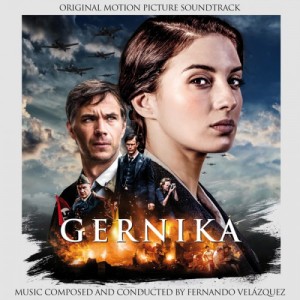
GERNIKA soundtrack | ©2016 Quartet Records
AX: You had a particularly busy year in 2016, with Quartet Records representing your Spanish releases. One impres-sive score was GERNIKA, which dealt with the awful bombing in Spain’s Civil War that also became Picasso’s most famous painting.
VELAZQUEZ: GERNIKA was a great opportunity to do a historic drama with really wonderful acting and great storytelling by my director friend Koldo Serra. It was just a big gift to have an opportunity to do this score. It is old fashioned in a way, because it is classical, big and orchestral. It is one of these scores that we are not allowed to do very often because they don’t want these big melodies or orchestrations. Many filmmakers think that things need to be small. I’m particularly proud of the end of the movie, which is the big and long cue.
AX: You also composed two delightful children’s’ scores for the animated dog comedy OZZY and the live action ad-venture ZIPIY ZAPE AND THE CAPTAIN’S ISLAND. What was it like working on the scores, especially when it came to giv-ing both a big orchestral sound?
VELAZQUEZ: I feel very passionate about orchestra and the big classical way of composing with themes and orchestra, because we aren’t able to do it often. I was very happy that I had both opportunities, because I’m a big fan of all the John Williams, Alan Silvestri and James Newton Howard scores. I’m just a little sorry these movies didn’t get that much attention, but the scores are there. They’re very rich and I hope people realize they’re out there on one day and get to listen to them. Even ZIPIY ZAPE gets big and emotional in the end. With melodies and themes, you will remember the theme if you listen to scores and watch the movie. This makes me happy. In electronics, there is another movie coming out that was just in the Austin festival called THE INVISIBLE GUEST. This is the complete opposite, be-cause it is a lot of electronics and orchestra, which was also a lot of fun to do because the music works in a different way. It was also really fun doing this.
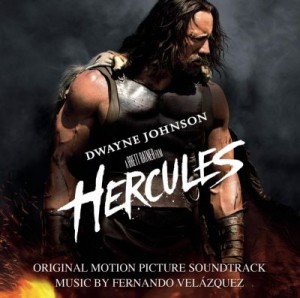
HERCULES soundtrack | ©2016 Sony Masterworks
AX: Given that you’re one of Spain’s busiest composers when it comes to Spanish-funded, or director-made English language films like HERCULES, MAMA and CRIMSON PEAK, how do you hope that A MONSTER CALLS might finally, and fully propel you into the realm of Hollywood? And do you hope to continue your lush, orchestral approach to scoring there, particularly when it comes to chilling subject matter?
VELAZQUEZ: Well, I think nowadays Hollywood is everywhere. You don’t really know where a film is being made. For example, MAMA got huge. It was a Spanish movie, mostly shot in Canada and scored in Spain. So, I don’t think Hollywood is necessarily the center of all film anymore. I think we have a lot to say from Spain. Of course, I’m very happy to do American movies. The studio movie world is a little tricky and I hope I will find a place without being forced to be very conservative and try to copy other music and composers. Honestly, I think voices are needed, not only in music but in filmmaking itself. I’m a composer, not an “orchestra guy.” I do electronics, which I love, and sometimes I do massive orchestral things. You know my first movie was scored with a chamber trio and I was very happy with it. It had nothing to do with big orchestras. The second movie I did was really only songs. So It’s not about doing only orchestra. The business can pi-geonhole you, but I think that if I’m lucky I will be able to do different things.
Pick up Fernando Velazquez’s score when “A Monster Calls” on Back Lot Music and Quartet Records HERE
Listen to THE IMPOSSIBLE HERE
Find many of Fernando’s releases on Quartet Records and Movie Score Media, including GERNIKA HERE, and SHIVER HERE
Special thanks to Gabby Belzer, Jana Davidoff and Amanda Greenbaum for arranging and transcribing this interview
Follow us on Twitter at ASSIGNMENT X
Like us on Facebook at ASSIGNMENT X
Article Source: Assignment X
Article: Interview with A MONSTER CALLS composer Fernando Velazquez
Related Posts:




